A Report on Legislation, Ethics, and Legal Framework in Tourism
VerifiedAdded on 2020/01/06
|13
|5002
|539
Report
AI Summary
This report delves into the legal and ethical dimensions of the travel and tourism sector. It begins by outlining the legal and regulatory framework, including key legislation like the Development of Tourism Act and Transport Acts, and explores the roles of various regulatory bodies such as the Health and Safety Commission and the International Air Transport Association. The report then examines surface, sea, and air transport laws, detailing passenger carriage regulations and liabilities. It further analyzes health, safety, and security legislation, evaluating its impact on the industry and emphasizing the importance of workplace safety. The report also addresses equality legislation and consumer protection, explaining contract and consumer rights. Finally, it investigates business ethics, including ethical dilemmas and the role of Corporate Social Responsibility (CSR) in the tourism sector, referencing specific examples like Thomas Cook and Bell View hotel. The report emphasizes the importance of adhering to legal and ethical standards to ensure quality service and protect both employees and customers.
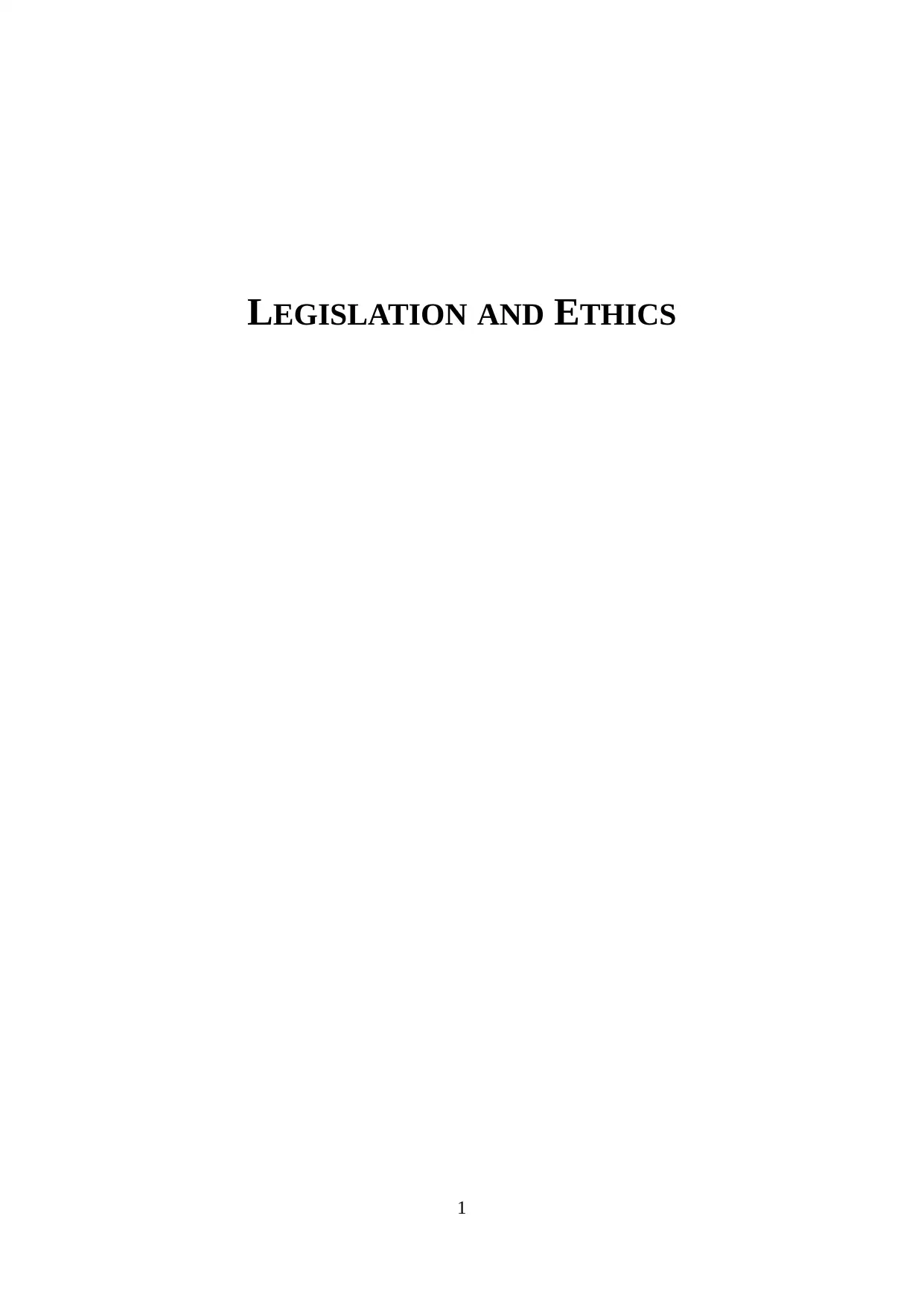
LEGISLATION AND ETHICS
1
1
Paraphrase This Document
Need a fresh take? Get an instant paraphrase of this document with our AI Paraphraser
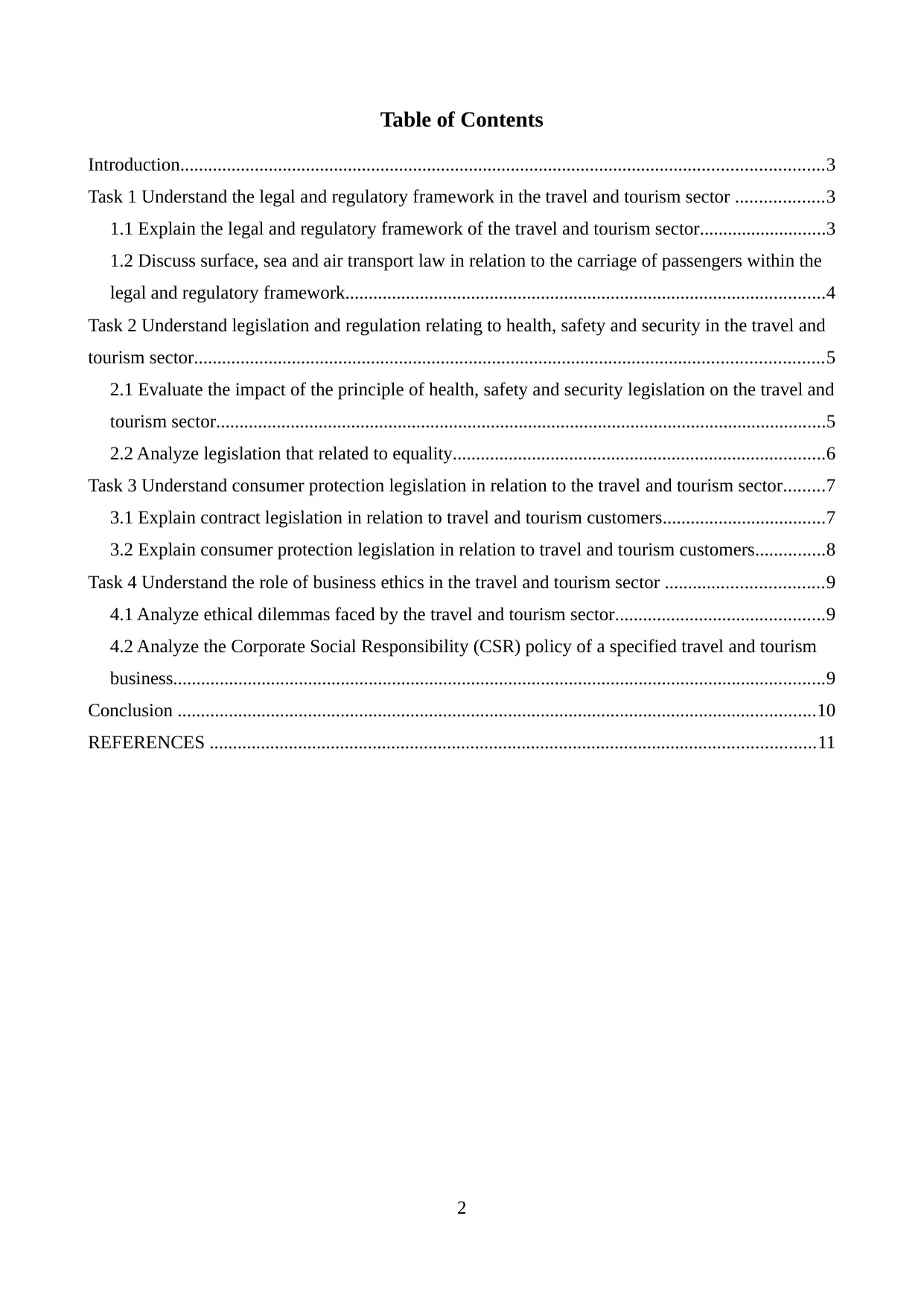
Table of Contents
Introduction..........................................................................................................................................3
Task 1 Understand the legal and regulatory framework in the travel and tourism sector ...................3
1.1 Explain the legal and regulatory framework of the travel and tourism sector...........................3
1.2 Discuss surface, sea and air transport law in relation to the carriage of passengers within the
legal and regulatory framework.......................................................................................................4
Task 2 Understand legislation and regulation relating to health, safety and security in the travel and
tourism sector.......................................................................................................................................5
2.1 Evaluate the impact of the principle of health, safety and security legislation on the travel and
tourism sector...................................................................................................................................5
2.2 Analyze legislation that related to equality................................................................................6
Task 3 Understand consumer protection legislation in relation to the travel and tourism sector.........7
3.1 Explain contract legislation in relation to travel and tourism customers...................................7
3.2 Explain consumer protection legislation in relation to travel and tourism customers...............8
Task 4 Understand the role of business ethics in the travel and tourism sector ..................................9
4.1 Analyze ethical dilemmas faced by the travel and tourism sector.............................................9
4.2 Analyze the Corporate Social Responsibility (CSR) policy of a specified travel and tourism
business............................................................................................................................................9
Conclusion .........................................................................................................................................10
REFERENCES ..................................................................................................................................11
2
Introduction..........................................................................................................................................3
Task 1 Understand the legal and regulatory framework in the travel and tourism sector ...................3
1.1 Explain the legal and regulatory framework of the travel and tourism sector...........................3
1.2 Discuss surface, sea and air transport law in relation to the carriage of passengers within the
legal and regulatory framework.......................................................................................................4
Task 2 Understand legislation and regulation relating to health, safety and security in the travel and
tourism sector.......................................................................................................................................5
2.1 Evaluate the impact of the principle of health, safety and security legislation on the travel and
tourism sector...................................................................................................................................5
2.2 Analyze legislation that related to equality................................................................................6
Task 3 Understand consumer protection legislation in relation to the travel and tourism sector.........7
3.1 Explain contract legislation in relation to travel and tourism customers...................................7
3.2 Explain consumer protection legislation in relation to travel and tourism customers...............8
Task 4 Understand the role of business ethics in the travel and tourism sector ..................................9
4.1 Analyze ethical dilemmas faced by the travel and tourism sector.............................................9
4.2 Analyze the Corporate Social Responsibility (CSR) policy of a specified travel and tourism
business............................................................................................................................................9
Conclusion .........................................................................................................................................10
REFERENCES ..................................................................................................................................11
2
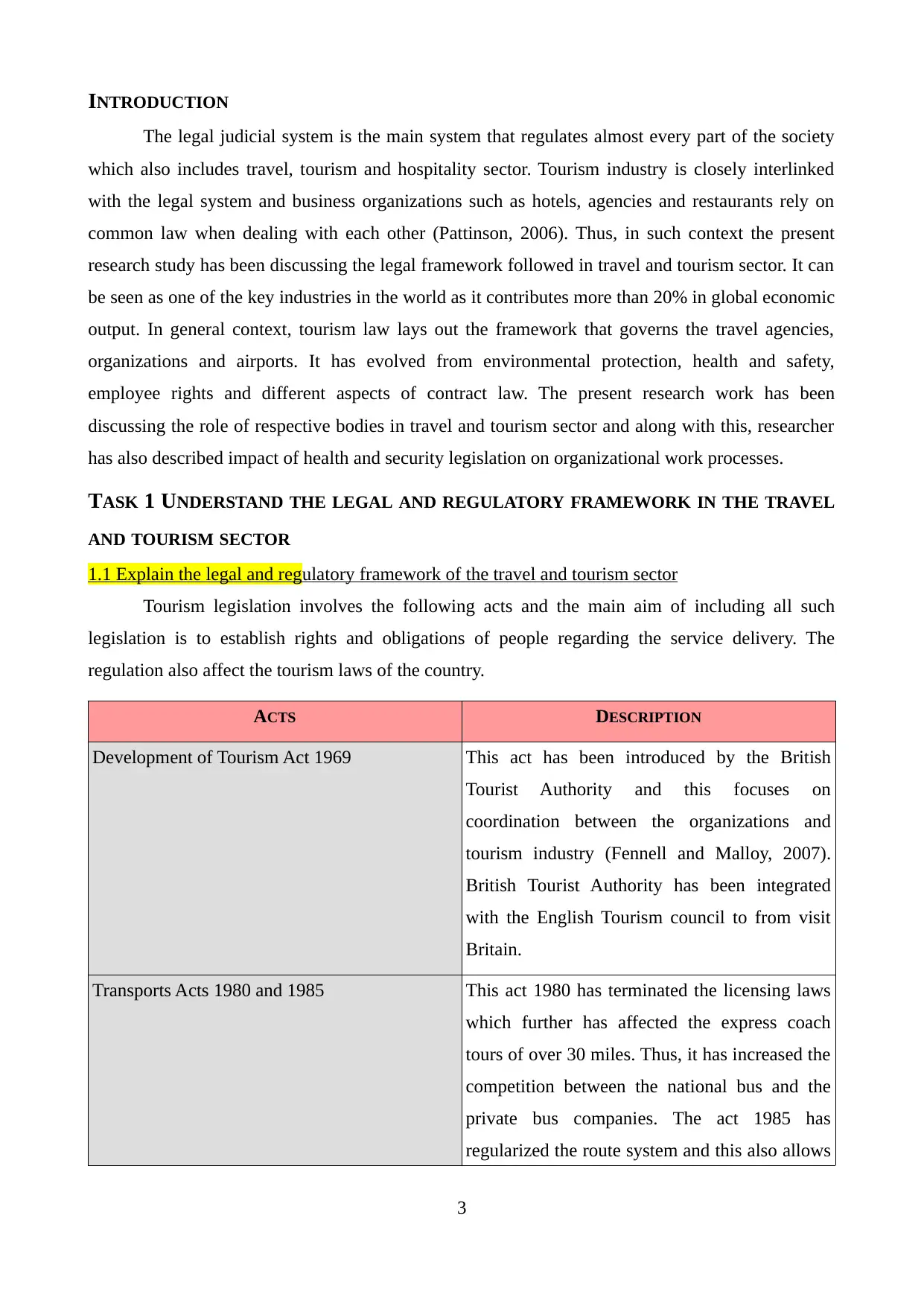
INTRODUCTION
The legal judicial system is the main system that regulates almost every part of the society
which also includes travel, tourism and hospitality sector. Tourism industry is closely interlinked
with the legal system and business organizations such as hotels, agencies and restaurants rely on
common law when dealing with each other (Pattinson, 2006). Thus, in such context the present
research study has been discussing the legal framework followed in travel and tourism sector. It can
be seen as one of the key industries in the world as it contributes more than 20% in global economic
output. In general context, tourism law lays out the framework that governs the travel agencies,
organizations and airports. It has evolved from environmental protection, health and safety,
employee rights and different aspects of contract law. The present research work has been
discussing the role of respective bodies in travel and tourism sector and along with this, researcher
has also described impact of health and security legislation on organizational work processes.
TASK 1 UNDERSTAND THE LEGAL AND REGULATORY FRAMEWORK IN THE TRAVEL
AND TOURISM SECTOR
1.1 Explain the legal and regulatory framework of the travel and tourism sector
Tourism legislation involves the following acts and the main aim of including all such
legislation is to establish rights and obligations of people regarding the service delivery. The
regulation also affect the tourism laws of the country.
ACTS DESCRIPTION
Development of Tourism Act 1969 This act has been introduced by the British
Tourist Authority and this focuses on
coordination between the organizations and
tourism industry (Fennell and Malloy, 2007).
British Tourist Authority has been integrated
with the English Tourism council to from visit
Britain.
Transports Acts 1980 and 1985 This act 1980 has terminated the licensing laws
which further has affected the express coach
tours of over 30 miles. Thus, it has increased the
competition between the national bus and the
private bus companies. The act 1985 has
regularized the route system and this also allows
3
The legal judicial system is the main system that regulates almost every part of the society
which also includes travel, tourism and hospitality sector. Tourism industry is closely interlinked
with the legal system and business organizations such as hotels, agencies and restaurants rely on
common law when dealing with each other (Pattinson, 2006). Thus, in such context the present
research study has been discussing the legal framework followed in travel and tourism sector. It can
be seen as one of the key industries in the world as it contributes more than 20% in global economic
output. In general context, tourism law lays out the framework that governs the travel agencies,
organizations and airports. It has evolved from environmental protection, health and safety,
employee rights and different aspects of contract law. The present research work has been
discussing the role of respective bodies in travel and tourism sector and along with this, researcher
has also described impact of health and security legislation on organizational work processes.
TASK 1 UNDERSTAND THE LEGAL AND REGULATORY FRAMEWORK IN THE TRAVEL
AND TOURISM SECTOR
1.1 Explain the legal and regulatory framework of the travel and tourism sector
Tourism legislation involves the following acts and the main aim of including all such
legislation is to establish rights and obligations of people regarding the service delivery. The
regulation also affect the tourism laws of the country.
ACTS DESCRIPTION
Development of Tourism Act 1969 This act has been introduced by the British
Tourist Authority and this focuses on
coordination between the organizations and
tourism industry (Fennell and Malloy, 2007).
British Tourist Authority has been integrated
with the English Tourism council to from visit
Britain.
Transports Acts 1980 and 1985 This act 1980 has terminated the licensing laws
which further has affected the express coach
tours of over 30 miles. Thus, it has increased the
competition between the national bus and the
private bus companies. The act 1985 has
regularized the route system and this also allows
3
⊘ This is a preview!⊘
Do you want full access?
Subscribe today to unlock all pages.

Trusted by 1+ million students worldwide
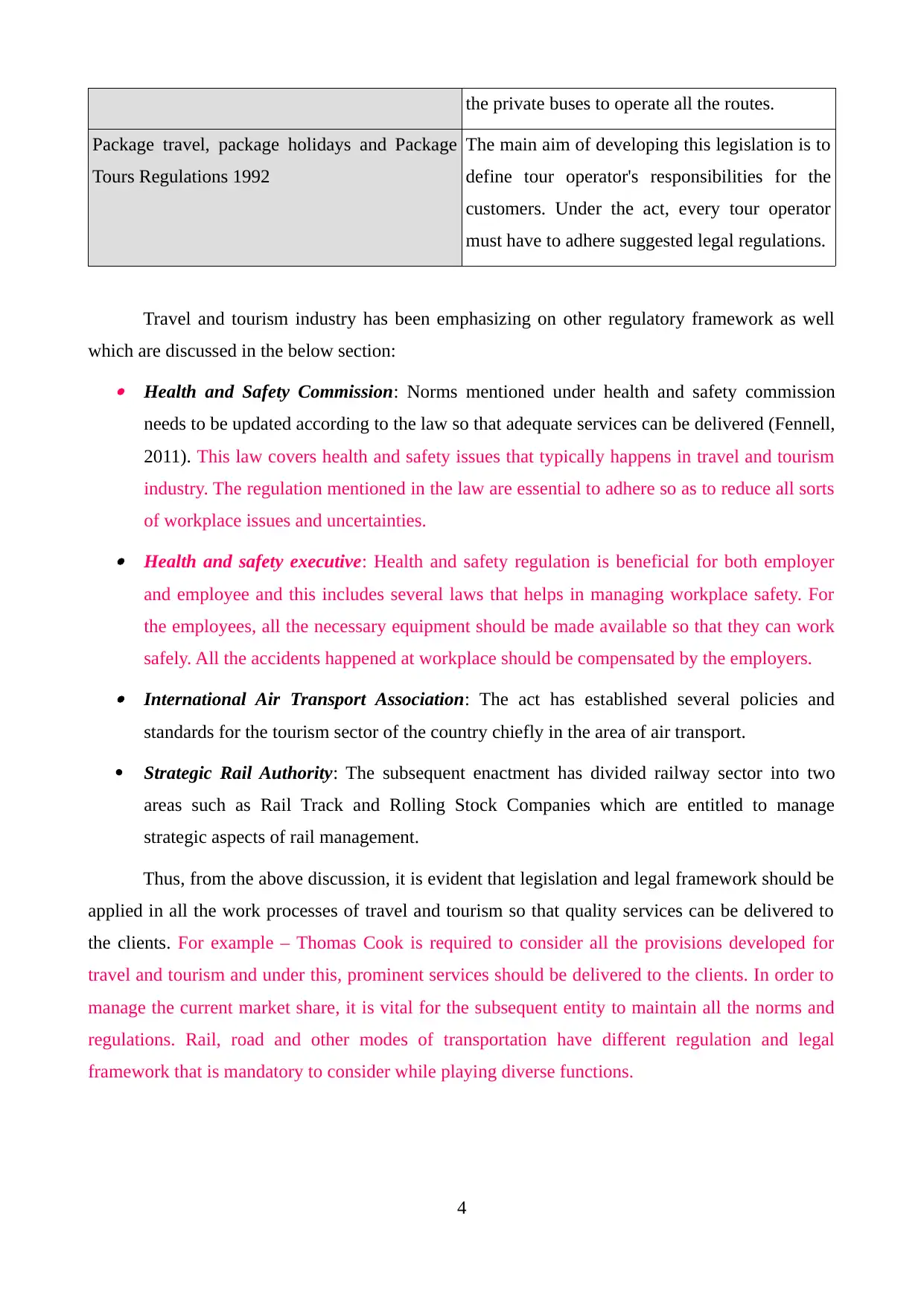
the private buses to operate all the routes.
Package travel, package holidays and Package
Tours Regulations 1992
The main aim of developing this legislation is to
define tour operator's responsibilities for the
customers. Under the act, every tour operator
must have to adhere suggested legal regulations.
Travel and tourism industry has been emphasizing on other regulatory framework as well
which are discussed in the below section:
Health and Safety Commission: Norms mentioned under health and safety commission
needs to be updated according to the law so that adequate services can be delivered (Fennell,
2011). This law covers health and safety issues that typically happens in travel and tourism
industry. The regulation mentioned in the law are essential to adhere so as to reduce all sorts
of workplace issues and uncertainties.
Health and safety executive: Health and safety regulation is beneficial for both employer
and employee and this includes several laws that helps in managing workplace safety. For
the employees, all the necessary equipment should be made available so that they can work
safely. All the accidents happened at workplace should be compensated by the employers.
International Air Transport Association: The act has established several policies and
standards for the tourism sector of the country chiefly in the area of air transport.
Strategic Rail Authority: The subsequent enactment has divided railway sector into two
areas such as Rail Track and Rolling Stock Companies which are entitled to manage
strategic aspects of rail management.
Thus, from the above discussion, it is evident that legislation and legal framework should be
applied in all the work processes of travel and tourism so that quality services can be delivered to
the clients. For example – Thomas Cook is required to consider all the provisions developed for
travel and tourism and under this, prominent services should be delivered to the clients. In order to
manage the current market share, it is vital for the subsequent entity to maintain all the norms and
regulations. Rail, road and other modes of transportation have different regulation and legal
framework that is mandatory to consider while playing diverse functions.
4
Package travel, package holidays and Package
Tours Regulations 1992
The main aim of developing this legislation is to
define tour operator's responsibilities for the
customers. Under the act, every tour operator
must have to adhere suggested legal regulations.
Travel and tourism industry has been emphasizing on other regulatory framework as well
which are discussed in the below section:
Health and Safety Commission: Norms mentioned under health and safety commission
needs to be updated according to the law so that adequate services can be delivered (Fennell,
2011). This law covers health and safety issues that typically happens in travel and tourism
industry. The regulation mentioned in the law are essential to adhere so as to reduce all sorts
of workplace issues and uncertainties.
Health and safety executive: Health and safety regulation is beneficial for both employer
and employee and this includes several laws that helps in managing workplace safety. For
the employees, all the necessary equipment should be made available so that they can work
safely. All the accidents happened at workplace should be compensated by the employers.
International Air Transport Association: The act has established several policies and
standards for the tourism sector of the country chiefly in the area of air transport.
Strategic Rail Authority: The subsequent enactment has divided railway sector into two
areas such as Rail Track and Rolling Stock Companies which are entitled to manage
strategic aspects of rail management.
Thus, from the above discussion, it is evident that legislation and legal framework should be
applied in all the work processes of travel and tourism so that quality services can be delivered to
the clients. For example – Thomas Cook is required to consider all the provisions developed for
travel and tourism and under this, prominent services should be delivered to the clients. In order to
manage the current market share, it is vital for the subsequent entity to maintain all the norms and
regulations. Rail, road and other modes of transportation have different regulation and legal
framework that is mandatory to consider while playing diverse functions.
4
Paraphrase This Document
Need a fresh take? Get an instant paraphrase of this document with our AI Paraphraser
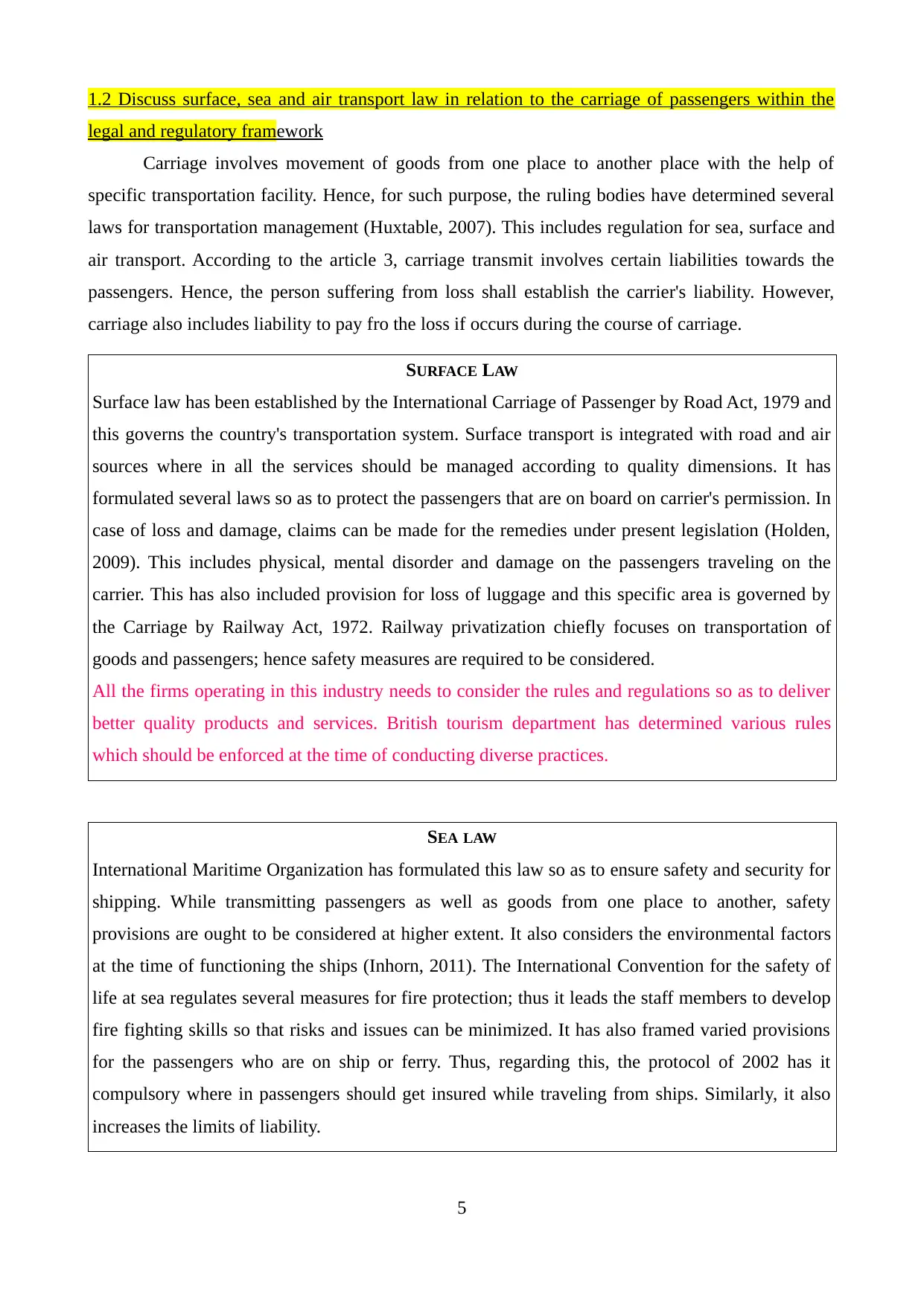
1.2 Discuss surface, sea and air transport law in relation to the carriage of passengers within the
legal and regulatory framework
Carriage involves movement of goods from one place to another place with the help of
specific transportation facility. Hence, for such purpose, the ruling bodies have determined several
laws for transportation management (Huxtable, 2007). This includes regulation for sea, surface and
air transport. According to the article 3, carriage transmit involves certain liabilities towards the
passengers. Hence, the person suffering from loss shall establish the carrier's liability. However,
carriage also includes liability to pay fro the loss if occurs during the course of carriage.
SURFACE LAW
Surface law has been established by the International Carriage of Passenger by Road Act, 1979 and
this governs the country's transportation system. Surface transport is integrated with road and air
sources where in all the services should be managed according to quality dimensions. It has
formulated several laws so as to protect the passengers that are on board on carrier's permission. In
case of loss and damage, claims can be made for the remedies under present legislation (Holden,
2009). This includes physical, mental disorder and damage on the passengers traveling on the
carrier. This has also included provision for loss of luggage and this specific area is governed by
the Carriage by Railway Act, 1972. Railway privatization chiefly focuses on transportation of
goods and passengers; hence safety measures are required to be considered.
All the firms operating in this industry needs to consider the rules and regulations so as to deliver
better quality products and services. British tourism department has determined various rules
which should be enforced at the time of conducting diverse practices.
SEA LAW
International Maritime Organization has formulated this law so as to ensure safety and security for
shipping. While transmitting passengers as well as goods from one place to another, safety
provisions are ought to be considered at higher extent. It also considers the environmental factors
at the time of functioning the ships (Inhorn, 2011). The International Convention for the safety of
life at sea regulates several measures for fire protection; thus it leads the staff members to develop
fire fighting skills so that risks and issues can be minimized. It has also framed varied provisions
for the passengers who are on ship or ferry. Thus, regarding this, the protocol of 2002 has it
compulsory where in passengers should get insured while traveling from ships. Similarly, it also
increases the limits of liability.
5
legal and regulatory framework
Carriage involves movement of goods from one place to another place with the help of
specific transportation facility. Hence, for such purpose, the ruling bodies have determined several
laws for transportation management (Huxtable, 2007). This includes regulation for sea, surface and
air transport. According to the article 3, carriage transmit involves certain liabilities towards the
passengers. Hence, the person suffering from loss shall establish the carrier's liability. However,
carriage also includes liability to pay fro the loss if occurs during the course of carriage.
SURFACE LAW
Surface law has been established by the International Carriage of Passenger by Road Act, 1979 and
this governs the country's transportation system. Surface transport is integrated with road and air
sources where in all the services should be managed according to quality dimensions. It has
formulated several laws so as to protect the passengers that are on board on carrier's permission. In
case of loss and damage, claims can be made for the remedies under present legislation (Holden,
2009). This includes physical, mental disorder and damage on the passengers traveling on the
carrier. This has also included provision for loss of luggage and this specific area is governed by
the Carriage by Railway Act, 1972. Railway privatization chiefly focuses on transportation of
goods and passengers; hence safety measures are required to be considered.
All the firms operating in this industry needs to consider the rules and regulations so as to deliver
better quality products and services. British tourism department has determined various rules
which should be enforced at the time of conducting diverse practices.
SEA LAW
International Maritime Organization has formulated this law so as to ensure safety and security for
shipping. While transmitting passengers as well as goods from one place to another, safety
provisions are ought to be considered at higher extent. It also considers the environmental factors
at the time of functioning the ships (Inhorn, 2011). The International Convention for the safety of
life at sea regulates several measures for fire protection; thus it leads the staff members to develop
fire fighting skills so that risks and issues can be minimized. It has also framed varied provisions
for the passengers who are on ship or ferry. Thus, regarding this, the protocol of 2002 has it
compulsory where in passengers should get insured while traveling from ships. Similarly, it also
increases the limits of liability.
5
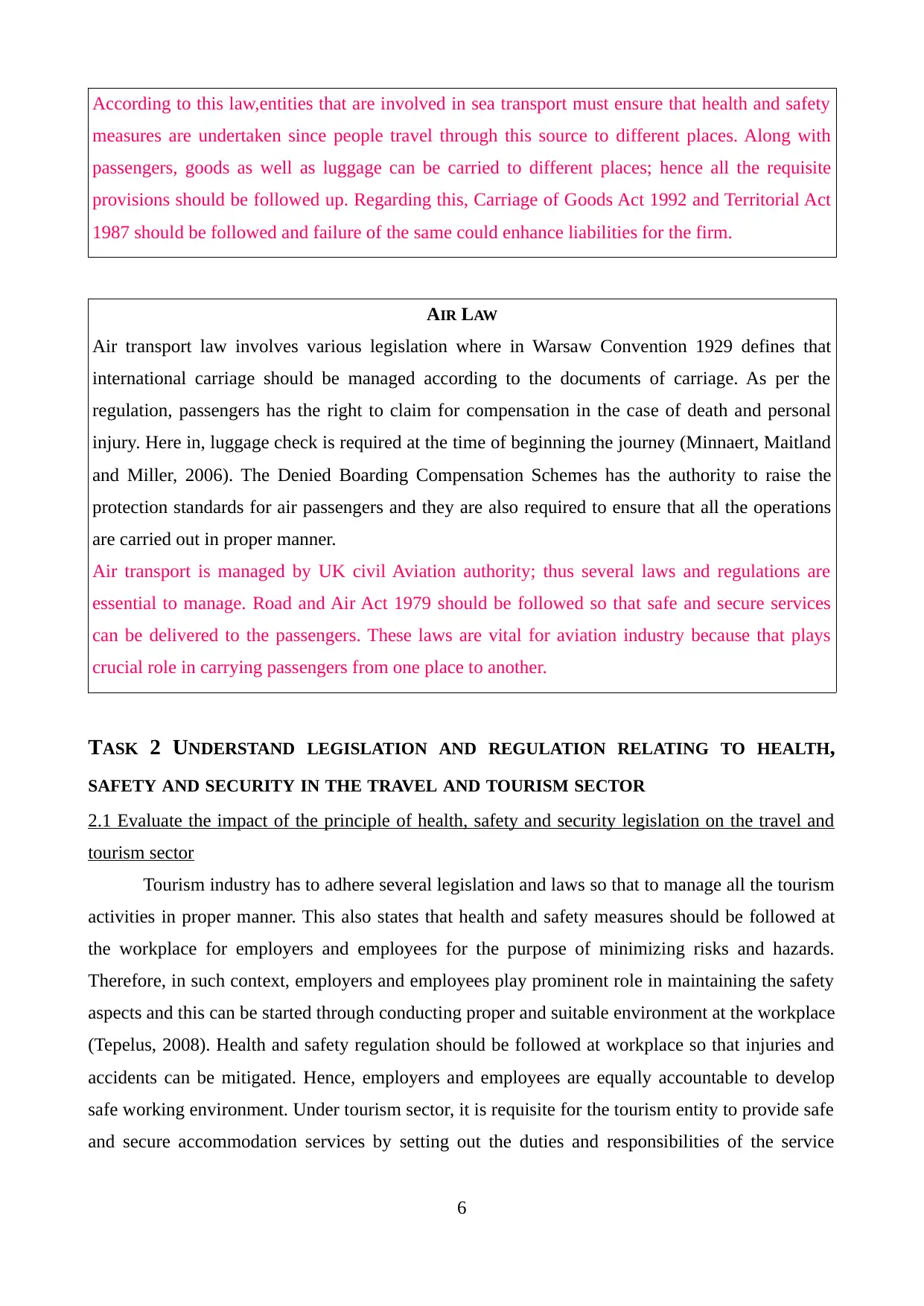
According to this law,entities that are involved in sea transport must ensure that health and safety
measures are undertaken since people travel through this source to different places. Along with
passengers, goods as well as luggage can be carried to different places; hence all the requisite
provisions should be followed up. Regarding this, Carriage of Goods Act 1992 and Territorial Act
1987 should be followed and failure of the same could enhance liabilities for the firm.
AIR LAW
Air transport law involves various legislation where in Warsaw Convention 1929 defines that
international carriage should be managed according to the documents of carriage. As per the
regulation, passengers has the right to claim for compensation in the case of death and personal
injury. Here in, luggage check is required at the time of beginning the journey (Minnaert, Maitland
and Miller, 2006). The Denied Boarding Compensation Schemes has the authority to raise the
protection standards for air passengers and they are also required to ensure that all the operations
are carried out in proper manner.
Air transport is managed by UK civil Aviation authority; thus several laws and regulations are
essential to manage. Road and Air Act 1979 should be followed so that safe and secure services
can be delivered to the passengers. These laws are vital for aviation industry because that plays
crucial role in carrying passengers from one place to another.
TASK 2 UNDERSTAND LEGISLATION AND REGULATION RELATING TO HEALTH,
SAFETY AND SECURITY IN THE TRAVEL AND TOURISM SECTOR
2.1 Evaluate the impact of the principle of health, safety and security legislation on the travel and
tourism sector
Tourism industry has to adhere several legislation and laws so that to manage all the tourism
activities in proper manner. This also states that health and safety measures should be followed at
the workplace for employers and employees for the purpose of minimizing risks and hazards.
Therefore, in such context, employers and employees play prominent role in maintaining the safety
aspects and this can be started through conducting proper and suitable environment at the workplace
(Tepelus, 2008). Health and safety regulation should be followed at workplace so that injuries and
accidents can be mitigated. Hence, employers and employees are equally accountable to develop
safe working environment. Under tourism sector, it is requisite for the tourism entity to provide safe
and secure accommodation services by setting out the duties and responsibilities of the service
6
measures are undertaken since people travel through this source to different places. Along with
passengers, goods as well as luggage can be carried to different places; hence all the requisite
provisions should be followed up. Regarding this, Carriage of Goods Act 1992 and Territorial Act
1987 should be followed and failure of the same could enhance liabilities for the firm.
AIR LAW
Air transport law involves various legislation where in Warsaw Convention 1929 defines that
international carriage should be managed according to the documents of carriage. As per the
regulation, passengers has the right to claim for compensation in the case of death and personal
injury. Here in, luggage check is required at the time of beginning the journey (Minnaert, Maitland
and Miller, 2006). The Denied Boarding Compensation Schemes has the authority to raise the
protection standards for air passengers and they are also required to ensure that all the operations
are carried out in proper manner.
Air transport is managed by UK civil Aviation authority; thus several laws and regulations are
essential to manage. Road and Air Act 1979 should be followed so that safe and secure services
can be delivered to the passengers. These laws are vital for aviation industry because that plays
crucial role in carrying passengers from one place to another.
TASK 2 UNDERSTAND LEGISLATION AND REGULATION RELATING TO HEALTH,
SAFETY AND SECURITY IN THE TRAVEL AND TOURISM SECTOR
2.1 Evaluate the impact of the principle of health, safety and security legislation on the travel and
tourism sector
Tourism industry has to adhere several legislation and laws so that to manage all the tourism
activities in proper manner. This also states that health and safety measures should be followed at
the workplace for employers and employees for the purpose of minimizing risks and hazards.
Therefore, in such context, employers and employees play prominent role in maintaining the safety
aspects and this can be started through conducting proper and suitable environment at the workplace
(Tepelus, 2008). Health and safety regulation should be followed at workplace so that injuries and
accidents can be mitigated. Hence, employers and employees are equally accountable to develop
safe working environment. Under tourism sector, it is requisite for the tourism entity to provide safe
and secure accommodation services by setting out the duties and responsibilities of the service
6
⊘ This is a preview!⊘
Do you want full access?
Subscribe today to unlock all pages.

Trusted by 1+ million students worldwide
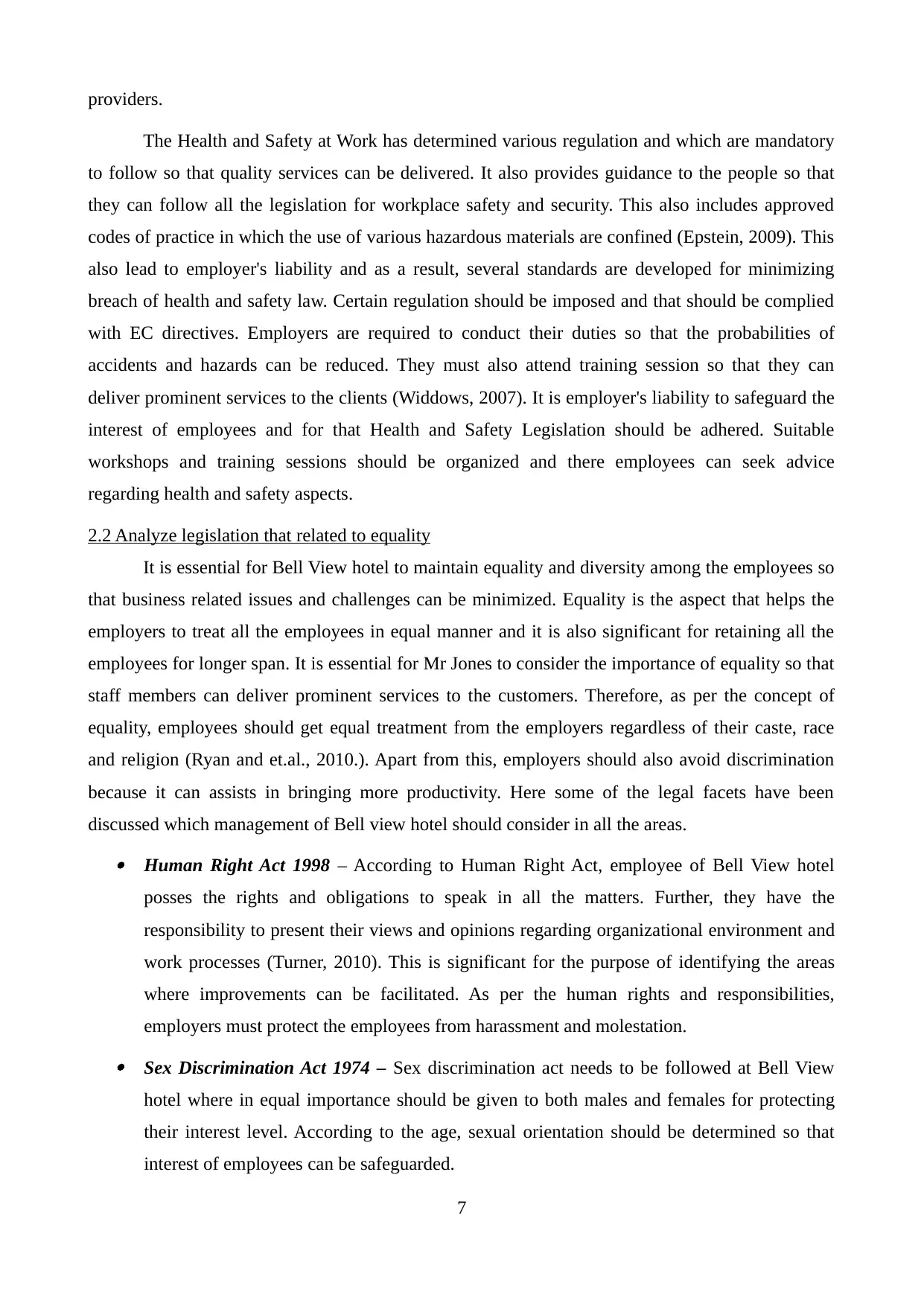
providers.
The Health and Safety at Work has determined various regulation and which are mandatory
to follow so that quality services can be delivered. It also provides guidance to the people so that
they can follow all the legislation for workplace safety and security. This also includes approved
codes of practice in which the use of various hazardous materials are confined (Epstein, 2009). This
also lead to employer's liability and as a result, several standards are developed for minimizing
breach of health and safety law. Certain regulation should be imposed and that should be complied
with EC directives. Employers are required to conduct their duties so that the probabilities of
accidents and hazards can be reduced. They must also attend training session so that they can
deliver prominent services to the clients (Widdows, 2007). It is employer's liability to safeguard the
interest of employees and for that Health and Safety Legislation should be adhered. Suitable
workshops and training sessions should be organized and there employees can seek advice
regarding health and safety aspects.
2.2 Analyze legislation that related to equality
It is essential for Bell View hotel to maintain equality and diversity among the employees so
that business related issues and challenges can be minimized. Equality is the aspect that helps the
employers to treat all the employees in equal manner and it is also significant for retaining all the
employees for longer span. It is essential for Mr Jones to consider the importance of equality so that
staff members can deliver prominent services to the customers. Therefore, as per the concept of
equality, employees should get equal treatment from the employers regardless of their caste, race
and religion (Ryan and et.al., 2010.). Apart from this, employers should also avoid discrimination
because it can assists in bringing more productivity. Here some of the legal facets have been
discussed which management of Bell view hotel should consider in all the areas.
Human Right Act 1998 – According to Human Right Act, employee of Bell View hotel
posses the rights and obligations to speak in all the matters. Further, they have the
responsibility to present their views and opinions regarding organizational environment and
work processes (Turner, 2010). This is significant for the purpose of identifying the areas
where improvements can be facilitated. As per the human rights and responsibilities,
employers must protect the employees from harassment and molestation.
Sex Discrimination Act 1974 – Sex discrimination act needs to be followed at Bell View
hotel where in equal importance should be given to both males and females for protecting
their interest level. According to the age, sexual orientation should be determined so that
interest of employees can be safeguarded.
7
The Health and Safety at Work has determined various regulation and which are mandatory
to follow so that quality services can be delivered. It also provides guidance to the people so that
they can follow all the legislation for workplace safety and security. This also includes approved
codes of practice in which the use of various hazardous materials are confined (Epstein, 2009). This
also lead to employer's liability and as a result, several standards are developed for minimizing
breach of health and safety law. Certain regulation should be imposed and that should be complied
with EC directives. Employers are required to conduct their duties so that the probabilities of
accidents and hazards can be reduced. They must also attend training session so that they can
deliver prominent services to the clients (Widdows, 2007). It is employer's liability to safeguard the
interest of employees and for that Health and Safety Legislation should be adhered. Suitable
workshops and training sessions should be organized and there employees can seek advice
regarding health and safety aspects.
2.2 Analyze legislation that related to equality
It is essential for Bell View hotel to maintain equality and diversity among the employees so
that business related issues and challenges can be minimized. Equality is the aspect that helps the
employers to treat all the employees in equal manner and it is also significant for retaining all the
employees for longer span. It is essential for Mr Jones to consider the importance of equality so that
staff members can deliver prominent services to the customers. Therefore, as per the concept of
equality, employees should get equal treatment from the employers regardless of their caste, race
and religion (Ryan and et.al., 2010.). Apart from this, employers should also avoid discrimination
because it can assists in bringing more productivity. Here some of the legal facets have been
discussed which management of Bell view hotel should consider in all the areas.
Human Right Act 1998 – According to Human Right Act, employee of Bell View hotel
posses the rights and obligations to speak in all the matters. Further, they have the
responsibility to present their views and opinions regarding organizational environment and
work processes (Turner, 2010). This is significant for the purpose of identifying the areas
where improvements can be facilitated. As per the human rights and responsibilities,
employers must protect the employees from harassment and molestation.
Sex Discrimination Act 1974 – Sex discrimination act needs to be followed at Bell View
hotel where in equal importance should be given to both males and females for protecting
their interest level. According to the age, sexual orientation should be determined so that
interest of employees can be safeguarded.
7
Paraphrase This Document
Need a fresh take? Get an instant paraphrase of this document with our AI Paraphraser
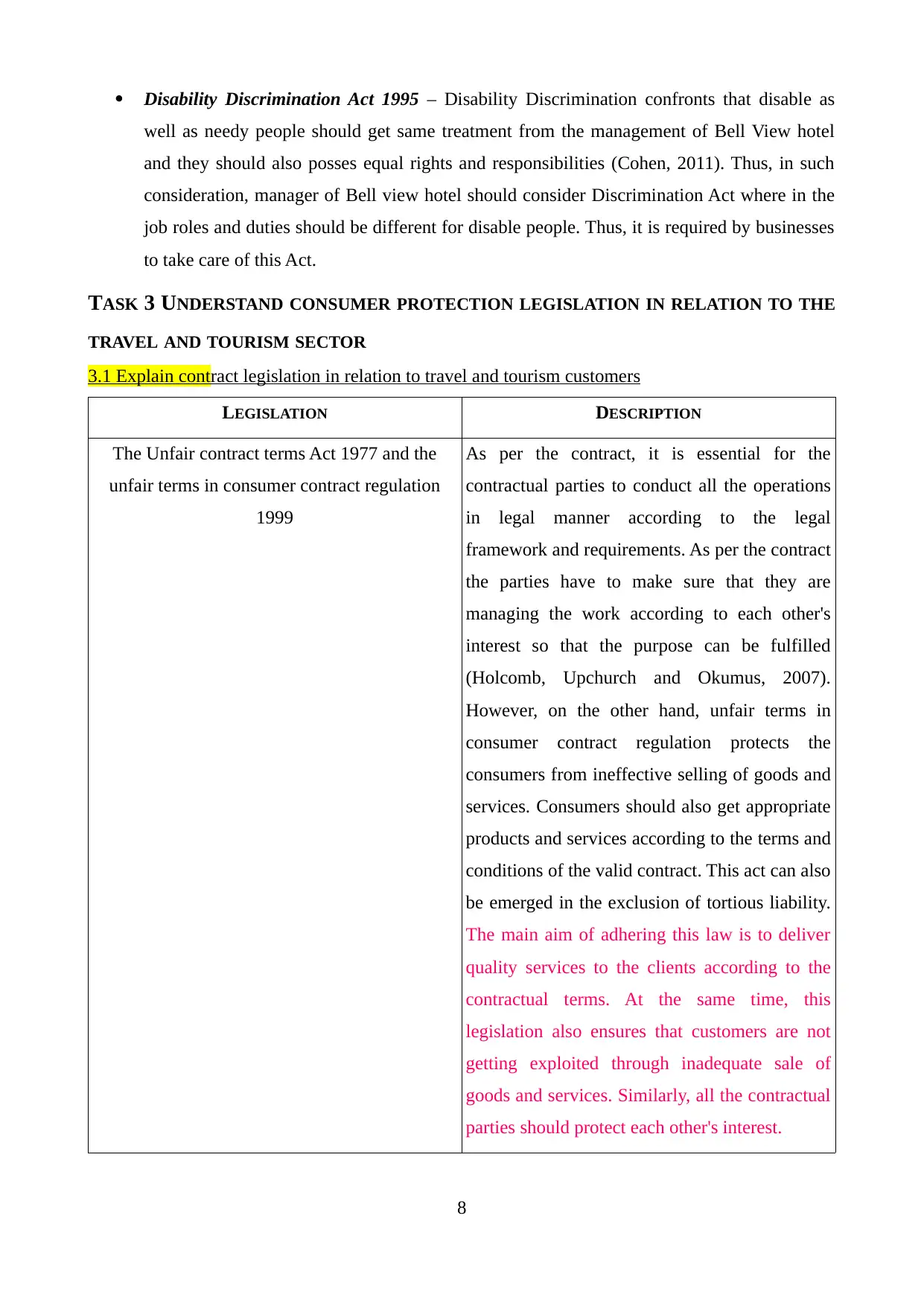
Disability Discrimination Act 1995 – Disability Discrimination confronts that disable as
well as needy people should get same treatment from the management of Bell View hotel
and they should also posses equal rights and responsibilities (Cohen, 2011). Thus, in such
consideration, manager of Bell view hotel should consider Discrimination Act where in the
job roles and duties should be different for disable people. Thus, it is required by businesses
to take care of this Act.
TASK 3 UNDERSTAND CONSUMER PROTECTION LEGISLATION IN RELATION TO THE
TRAVEL AND TOURISM SECTOR
3.1 Explain contract legislation in relation to travel and tourism customers
LEGISLATION DESCRIPTION
The Unfair contract terms Act 1977 and the
unfair terms in consumer contract regulation
1999
As per the contract, it is essential for the
contractual parties to conduct all the operations
in legal manner according to the legal
framework and requirements. As per the contract
the parties have to make sure that they are
managing the work according to each other's
interest so that the purpose can be fulfilled
(Holcomb, Upchurch and Okumus, 2007).
However, on the other hand, unfair terms in
consumer contract regulation protects the
consumers from ineffective selling of goods and
services. Consumers should also get appropriate
products and services according to the terms and
conditions of the valid contract. This act can also
be emerged in the exclusion of tortious liability.
The main aim of adhering this law is to deliver
quality services to the clients according to the
contractual terms. At the same time, this
legislation also ensures that customers are not
getting exploited through inadequate sale of
goods and services. Similarly, all the contractual
parties should protect each other's interest.
8
well as needy people should get same treatment from the management of Bell View hotel
and they should also posses equal rights and responsibilities (Cohen, 2011). Thus, in such
consideration, manager of Bell view hotel should consider Discrimination Act where in the
job roles and duties should be different for disable people. Thus, it is required by businesses
to take care of this Act.
TASK 3 UNDERSTAND CONSUMER PROTECTION LEGISLATION IN RELATION TO THE
TRAVEL AND TOURISM SECTOR
3.1 Explain contract legislation in relation to travel and tourism customers
LEGISLATION DESCRIPTION
The Unfair contract terms Act 1977 and the
unfair terms in consumer contract regulation
1999
As per the contract, it is essential for the
contractual parties to conduct all the operations
in legal manner according to the legal
framework and requirements. As per the contract
the parties have to make sure that they are
managing the work according to each other's
interest so that the purpose can be fulfilled
(Holcomb, Upchurch and Okumus, 2007).
However, on the other hand, unfair terms in
consumer contract regulation protects the
consumers from ineffective selling of goods and
services. Consumers should also get appropriate
products and services according to the terms and
conditions of the valid contract. This act can also
be emerged in the exclusion of tortious liability.
The main aim of adhering this law is to deliver
quality services to the clients according to the
contractual terms. At the same time, this
legislation also ensures that customers are not
getting exploited through inadequate sale of
goods and services. Similarly, all the contractual
parties should protect each other's interest.
8
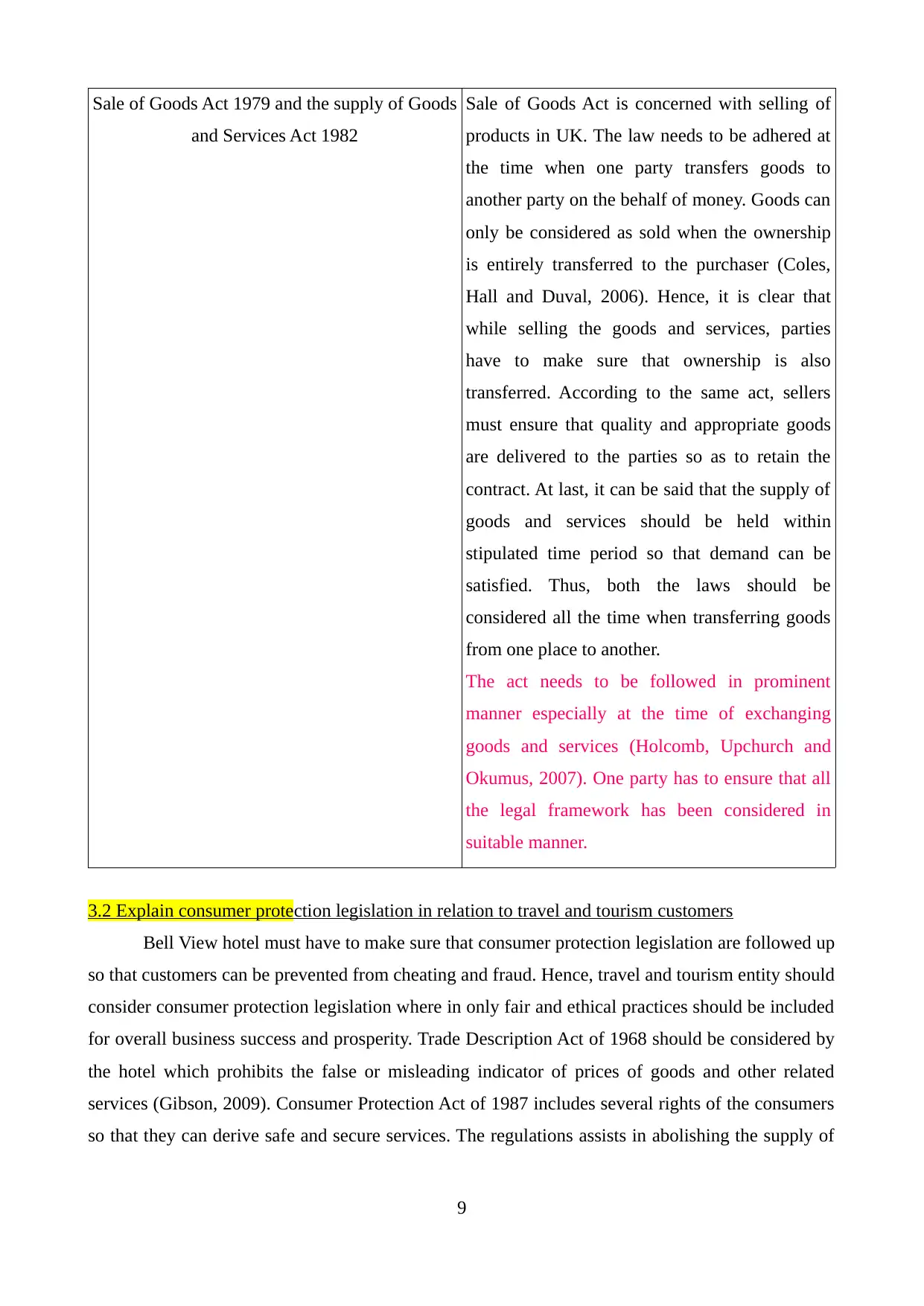
Sale of Goods Act 1979 and the supply of Goods
and Services Act 1982
Sale of Goods Act is concerned with selling of
products in UK. The law needs to be adhered at
the time when one party transfers goods to
another party on the behalf of money. Goods can
only be considered as sold when the ownership
is entirely transferred to the purchaser (Coles,
Hall and Duval, 2006). Hence, it is clear that
while selling the goods and services, parties
have to make sure that ownership is also
transferred. According to the same act, sellers
must ensure that quality and appropriate goods
are delivered to the parties so as to retain the
contract. At last, it can be said that the supply of
goods and services should be held within
stipulated time period so that demand can be
satisfied. Thus, both the laws should be
considered all the time when transferring goods
from one place to another.
The act needs to be followed in prominent
manner especially at the time of exchanging
goods and services (Holcomb, Upchurch and
Okumus, 2007). One party has to ensure that all
the legal framework has been considered in
suitable manner.
3.2 Explain consumer protection legislation in relation to travel and tourism customers
Bell View hotel must have to make sure that consumer protection legislation are followed up
so that customers can be prevented from cheating and fraud. Hence, travel and tourism entity should
consider consumer protection legislation where in only fair and ethical practices should be included
for overall business success and prosperity. Trade Description Act of 1968 should be considered by
the hotel which prohibits the false or misleading indicator of prices of goods and other related
services (Gibson, 2009). Consumer Protection Act of 1987 includes several rights of the consumers
so that they can derive safe and secure services. The regulations assists in abolishing the supply of
9
and Services Act 1982
Sale of Goods Act is concerned with selling of
products in UK. The law needs to be adhered at
the time when one party transfers goods to
another party on the behalf of money. Goods can
only be considered as sold when the ownership
is entirely transferred to the purchaser (Coles,
Hall and Duval, 2006). Hence, it is clear that
while selling the goods and services, parties
have to make sure that ownership is also
transferred. According to the same act, sellers
must ensure that quality and appropriate goods
are delivered to the parties so as to retain the
contract. At last, it can be said that the supply of
goods and services should be held within
stipulated time period so that demand can be
satisfied. Thus, both the laws should be
considered all the time when transferring goods
from one place to another.
The act needs to be followed in prominent
manner especially at the time of exchanging
goods and services (Holcomb, Upchurch and
Okumus, 2007). One party has to ensure that all
the legal framework has been considered in
suitable manner.
3.2 Explain consumer protection legislation in relation to travel and tourism customers
Bell View hotel must have to make sure that consumer protection legislation are followed up
so that customers can be prevented from cheating and fraud. Hence, travel and tourism entity should
consider consumer protection legislation where in only fair and ethical practices should be included
for overall business success and prosperity. Trade Description Act of 1968 should be considered by
the hotel which prohibits the false or misleading indicator of prices of goods and other related
services (Gibson, 2009). Consumer Protection Act of 1987 includes several rights of the consumers
so that they can derive safe and secure services. The regulations assists in abolishing the supply of
9
⊘ This is a preview!⊘
Do you want full access?
Subscribe today to unlock all pages.

Trusted by 1+ million students worldwide
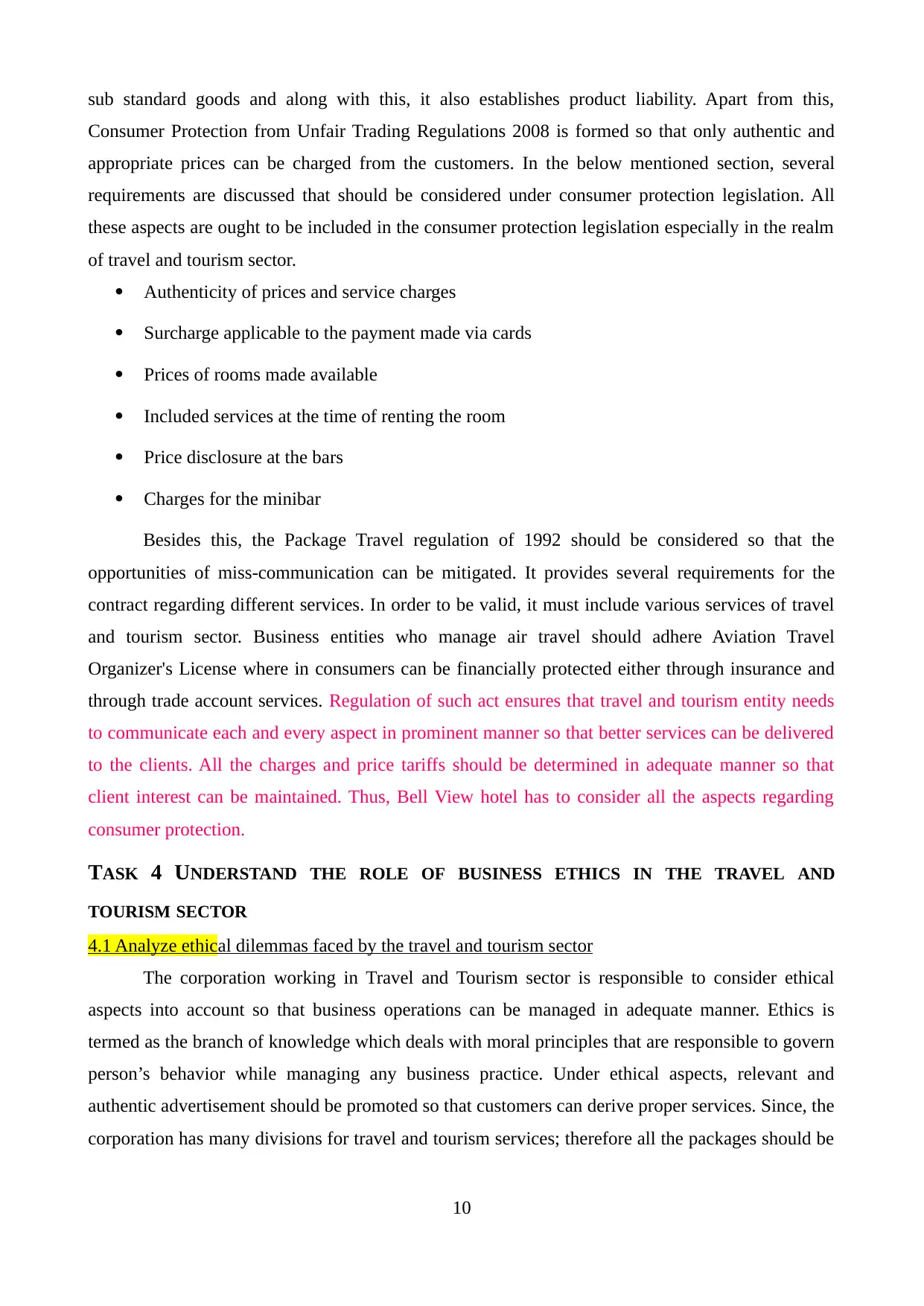
sub standard goods and along with this, it also establishes product liability. Apart from this,
Consumer Protection from Unfair Trading Regulations 2008 is formed so that only authentic and
appropriate prices can be charged from the customers. In the below mentioned section, several
requirements are discussed that should be considered under consumer protection legislation. All
these aspects are ought to be included in the consumer protection legislation especially in the realm
of travel and tourism sector.
Authenticity of prices and service charges
Surcharge applicable to the payment made via cards
Prices of rooms made available
Included services at the time of renting the room
Price disclosure at the bars
Charges for the minibar
Besides this, the Package Travel regulation of 1992 should be considered so that the
opportunities of miss-communication can be mitigated. It provides several requirements for the
contract regarding different services. In order to be valid, it must include various services of travel
and tourism sector. Business entities who manage air travel should adhere Aviation Travel
Organizer's License where in consumers can be financially protected either through insurance and
through trade account services. Regulation of such act ensures that travel and tourism entity needs
to communicate each and every aspect in prominent manner so that better services can be delivered
to the clients. All the charges and price tariffs should be determined in adequate manner so that
client interest can be maintained. Thus, Bell View hotel has to consider all the aspects regarding
consumer protection.
TASK 4 UNDERSTAND THE ROLE OF BUSINESS ETHICS IN THE TRAVEL AND
TOURISM SECTOR
4.1 Analyze ethical dilemmas faced by the travel and tourism sector
The corporation working in Travel and Tourism sector is responsible to consider ethical
aspects into account so that business operations can be managed in adequate manner. Ethics is
termed as the branch of knowledge which deals with moral principles that are responsible to govern
person’s behavior while managing any business practice. Under ethical aspects, relevant and
authentic advertisement should be promoted so that customers can derive proper services. Since, the
corporation has many divisions for travel and tourism services; therefore all the packages should be
10
Consumer Protection from Unfair Trading Regulations 2008 is formed so that only authentic and
appropriate prices can be charged from the customers. In the below mentioned section, several
requirements are discussed that should be considered under consumer protection legislation. All
these aspects are ought to be included in the consumer protection legislation especially in the realm
of travel and tourism sector.
Authenticity of prices and service charges
Surcharge applicable to the payment made via cards
Prices of rooms made available
Included services at the time of renting the room
Price disclosure at the bars
Charges for the minibar
Besides this, the Package Travel regulation of 1992 should be considered so that the
opportunities of miss-communication can be mitigated. It provides several requirements for the
contract regarding different services. In order to be valid, it must include various services of travel
and tourism sector. Business entities who manage air travel should adhere Aviation Travel
Organizer's License where in consumers can be financially protected either through insurance and
through trade account services. Regulation of such act ensures that travel and tourism entity needs
to communicate each and every aspect in prominent manner so that better services can be delivered
to the clients. All the charges and price tariffs should be determined in adequate manner so that
client interest can be maintained. Thus, Bell View hotel has to consider all the aspects regarding
consumer protection.
TASK 4 UNDERSTAND THE ROLE OF BUSINESS ETHICS IN THE TRAVEL AND
TOURISM SECTOR
4.1 Analyze ethical dilemmas faced by the travel and tourism sector
The corporation working in Travel and Tourism sector is responsible to consider ethical
aspects into account so that business operations can be managed in adequate manner. Ethics is
termed as the branch of knowledge which deals with moral principles that are responsible to govern
person’s behavior while managing any business practice. Under ethical aspects, relevant and
authentic advertisement should be promoted so that customers can derive proper services. Since, the
corporation has many divisions for travel and tourism services; therefore all the packages should be
10
Paraphrase This Document
Need a fresh take? Get an instant paraphrase of this document with our AI Paraphraser
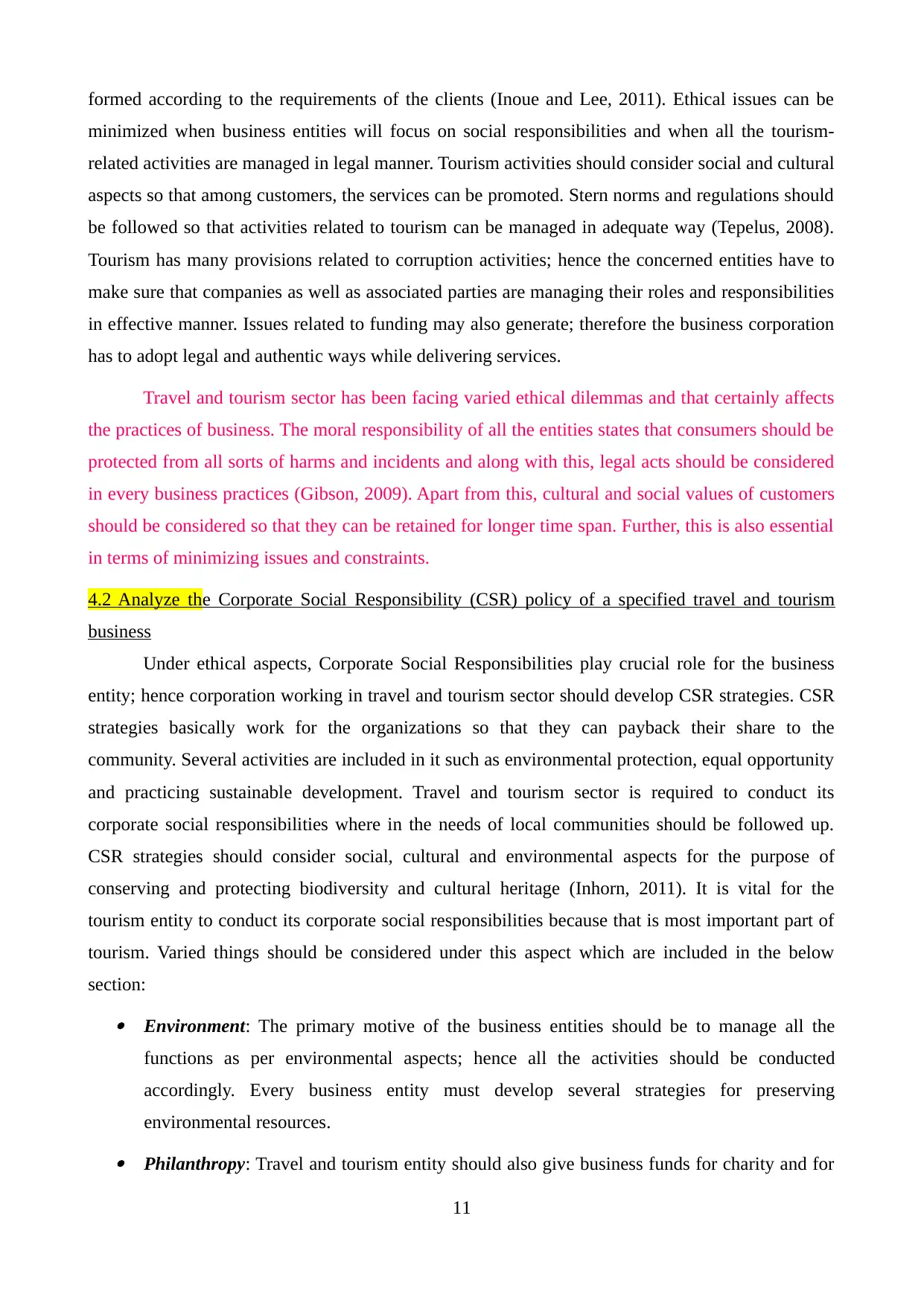
formed according to the requirements of the clients (Inoue and Lee, 2011). Ethical issues can be
minimized when business entities will focus on social responsibilities and when all the tourism-
related activities are managed in legal manner. Tourism activities should consider social and cultural
aspects so that among customers, the services can be promoted. Stern norms and regulations should
be followed so that activities related to tourism can be managed in adequate way (Tepelus, 2008).
Tourism has many provisions related to corruption activities; hence the concerned entities have to
make sure that companies as well as associated parties are managing their roles and responsibilities
in effective manner. Issues related to funding may also generate; therefore the business corporation
has to adopt legal and authentic ways while delivering services.
Travel and tourism sector has been facing varied ethical dilemmas and that certainly affects
the practices of business. The moral responsibility of all the entities states that consumers should be
protected from all sorts of harms and incidents and along with this, legal acts should be considered
in every business practices (Gibson, 2009). Apart from this, cultural and social values of customers
should be considered so that they can be retained for longer time span. Further, this is also essential
in terms of minimizing issues and constraints.
4.2 Analyze the Corporate Social Responsibility (CSR) policy of a specified travel and tourism
business
Under ethical aspects, Corporate Social Responsibilities play crucial role for the business
entity; hence corporation working in travel and tourism sector should develop CSR strategies. CSR
strategies basically work for the organizations so that they can payback their share to the
community. Several activities are included in it such as environmental protection, equal opportunity
and practicing sustainable development. Travel and tourism sector is required to conduct its
corporate social responsibilities where in the needs of local communities should be followed up.
CSR strategies should consider social, cultural and environmental aspects for the purpose of
conserving and protecting biodiversity and cultural heritage (Inhorn, 2011). It is vital for the
tourism entity to conduct its corporate social responsibilities because that is most important part of
tourism. Varied things should be considered under this aspect which are included in the below
section:
Environment: The primary motive of the business entities should be to manage all the
functions as per environmental aspects; hence all the activities should be conducted
accordingly. Every business entity must develop several strategies for preserving
environmental resources.
Philanthropy: Travel and tourism entity should also give business funds for charity and for
11
minimized when business entities will focus on social responsibilities and when all the tourism-
related activities are managed in legal manner. Tourism activities should consider social and cultural
aspects so that among customers, the services can be promoted. Stern norms and regulations should
be followed so that activities related to tourism can be managed in adequate way (Tepelus, 2008).
Tourism has many provisions related to corruption activities; hence the concerned entities have to
make sure that companies as well as associated parties are managing their roles and responsibilities
in effective manner. Issues related to funding may also generate; therefore the business corporation
has to adopt legal and authentic ways while delivering services.
Travel and tourism sector has been facing varied ethical dilemmas and that certainly affects
the practices of business. The moral responsibility of all the entities states that consumers should be
protected from all sorts of harms and incidents and along with this, legal acts should be considered
in every business practices (Gibson, 2009). Apart from this, cultural and social values of customers
should be considered so that they can be retained for longer time span. Further, this is also essential
in terms of minimizing issues and constraints.
4.2 Analyze the Corporate Social Responsibility (CSR) policy of a specified travel and tourism
business
Under ethical aspects, Corporate Social Responsibilities play crucial role for the business
entity; hence corporation working in travel and tourism sector should develop CSR strategies. CSR
strategies basically work for the organizations so that they can payback their share to the
community. Several activities are included in it such as environmental protection, equal opportunity
and practicing sustainable development. Travel and tourism sector is required to conduct its
corporate social responsibilities where in the needs of local communities should be followed up.
CSR strategies should consider social, cultural and environmental aspects for the purpose of
conserving and protecting biodiversity and cultural heritage (Inhorn, 2011). It is vital for the
tourism entity to conduct its corporate social responsibilities because that is most important part of
tourism. Varied things should be considered under this aspect which are included in the below
section:
Environment: The primary motive of the business entities should be to manage all the
functions as per environmental aspects; hence all the activities should be conducted
accordingly. Every business entity must develop several strategies for preserving
environmental resources.
Philanthropy: Travel and tourism entity should also give business funds for charity and for
11
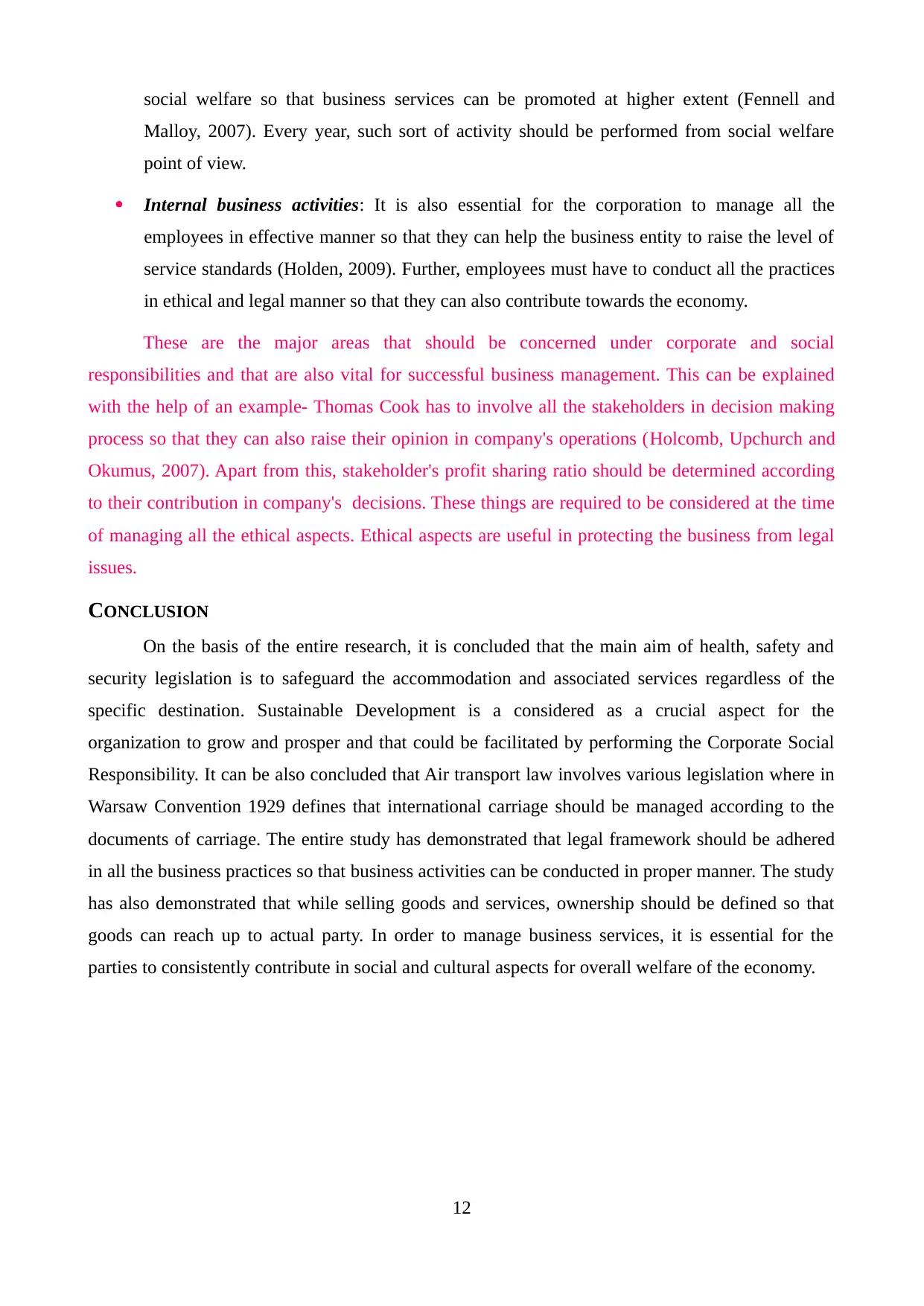
social welfare so that business services can be promoted at higher extent (Fennell and
Malloy, 2007). Every year, such sort of activity should be performed from social welfare
point of view.
Internal business activities: It is also essential for the corporation to manage all the
employees in effective manner so that they can help the business entity to raise the level of
service standards (Holden, 2009). Further, employees must have to conduct all the practices
in ethical and legal manner so that they can also contribute towards the economy.
These are the major areas that should be concerned under corporate and social
responsibilities and that are also vital for successful business management. This can be explained
with the help of an example- Thomas Cook has to involve all the stakeholders in decision making
process so that they can also raise their opinion in company's operations (Holcomb, Upchurch and
Okumus, 2007). Apart from this, stakeholder's profit sharing ratio should be determined according
to their contribution in company's decisions. These things are required to be considered at the time
of managing all the ethical aspects. Ethical aspects are useful in protecting the business from legal
issues.
CONCLUSION
On the basis of the entire research, it is concluded that the main aim of health, safety and
security legislation is to safeguard the accommodation and associated services regardless of the
specific destination. Sustainable Development is a considered as a crucial aspect for the
organization to grow and prosper and that could be facilitated by performing the Corporate Social
Responsibility. It can be also concluded that Air transport law involves various legislation where in
Warsaw Convention 1929 defines that international carriage should be managed according to the
documents of carriage. The entire study has demonstrated that legal framework should be adhered
in all the business practices so that business activities can be conducted in proper manner. The study
has also demonstrated that while selling goods and services, ownership should be defined so that
goods can reach up to actual party. In order to manage business services, it is essential for the
parties to consistently contribute in social and cultural aspects for overall welfare of the economy.
12
Malloy, 2007). Every year, such sort of activity should be performed from social welfare
point of view.
Internal business activities: It is also essential for the corporation to manage all the
employees in effective manner so that they can help the business entity to raise the level of
service standards (Holden, 2009). Further, employees must have to conduct all the practices
in ethical and legal manner so that they can also contribute towards the economy.
These are the major areas that should be concerned under corporate and social
responsibilities and that are also vital for successful business management. This can be explained
with the help of an example- Thomas Cook has to involve all the stakeholders in decision making
process so that they can also raise their opinion in company's operations (Holcomb, Upchurch and
Okumus, 2007). Apart from this, stakeholder's profit sharing ratio should be determined according
to their contribution in company's decisions. These things are required to be considered at the time
of managing all the ethical aspects. Ethical aspects are useful in protecting the business from legal
issues.
CONCLUSION
On the basis of the entire research, it is concluded that the main aim of health, safety and
security legislation is to safeguard the accommodation and associated services regardless of the
specific destination. Sustainable Development is a considered as a crucial aspect for the
organization to grow and prosper and that could be facilitated by performing the Corporate Social
Responsibility. It can be also concluded that Air transport law involves various legislation where in
Warsaw Convention 1929 defines that international carriage should be managed according to the
documents of carriage. The entire study has demonstrated that legal framework should be adhered
in all the business practices so that business activities can be conducted in proper manner. The study
has also demonstrated that while selling goods and services, ownership should be defined so that
goods can reach up to actual party. In order to manage business services, it is essential for the
parties to consistently contribute in social and cultural aspects for overall welfare of the economy.
12
⊘ This is a preview!⊘
Do you want full access?
Subscribe today to unlock all pages.

Trusted by 1+ million students worldwide
1 out of 13
Related Documents
Your All-in-One AI-Powered Toolkit for Academic Success.
+13062052269
info@desklib.com
Available 24*7 on WhatsApp / Email
![[object Object]](/_next/static/media/star-bottom.7253800d.svg)
Unlock your academic potential
Copyright © 2020–2025 A2Z Services. All Rights Reserved. Developed and managed by ZUCOL.



